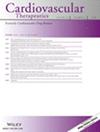Thymosin β4 Protects against Cardiac Damage and Subsequent Cardiac Fibrosis in Mice with Myocardial Infarction
IF 3.4
4区 医学
Q2 CARDIAC & CARDIOVASCULAR SYSTEMS
引用次数: 4
Abstract
Background Inflammation is a critical factor in the development and progression of myocardial infarction and cardiac fibrosis. Thymosin β4 (Tβ4) alleviates the disease process via protective antioxidant and anti-inflammatory mechanisms. Although Tβ4 has been shown to have a protective effect in myocardial infarction, its impact on cardiac fibrosis has not been well reported. In this study, we evaluated the influence of exogenous Tβ4 on myocardial infarction and cardiac fibrosis and explored the possible underlying mechanism. Methods Real-time quantitative reverse-transcription PCR (qRT-PCR), immunohistochemistry (IHC), and Western blot were used to analyze Tβ4 expression in acute myocardial infarction (AMI) cardiac tissues. The effects of intraperitoneal adeno-associated virus-Tβ4 (AAV-Tβ4) on ligation-induced AMI in mice were studied using cardiac function parameters, and RT-PCR, Western blot, HE staining, Masson staining, and IHC were used to assess the degree of myocardial fibrosis. The effects of Tβ4 were confirmed in vitro using mouse cardiac myocytes and myofibroblasts. Results Tβ4 was shown to be significantly elevated in mice AMI cardiac tissues. In mice, AAV-Tβ4 induced exogenous expression of Tβ4 significantly reduced oxidative damage, inflammation, cardiac dysfunction, and fibrosis. H2O2 inhibited mitophagy and increased inflammation in mouse cardiac myocytes via oxidative stress, and Tβ4 substantially reduced mitophagy inhibition and inflammasome activation in myocytes caused by H2O2. Furthermore, Tβ4 decreased cardiac myofibroblast growth and reduced TGF-β1-induced activation. Conclusions AAV-Tβ4 induced expression of Tβ4 reduced inflammation, heart damage, and eventual fibrosis in vivo. Tβ4 helped to reduce oxidative stress, promote mitophagy, and alleviate inflammation and fibrosis. Exogenous supplementation of Tβ4 might be a promising therapeutic agent for treating myocardial infarction as well as cardiac fibrosis.胸腺素β4对心肌梗死小鼠心脏损伤和随后的心脏纤维化的保护作用
炎症是心肌梗死和心肌纤维化发生发展的关键因素。胸腺素β4 (t - β4)通过保护性抗氧化和抗炎机制缓解疾病过程。虽然t - β4已被证明对心肌梗死具有保护作用,但其对心脏纤维化的影响尚未得到很好的报道。在本研究中,我们评估了外源性Tβ4对心肌梗死和心脏纤维化的影响,并探讨了可能的潜在机制。方法采用实时定量反转录PCR (qRT-PCR)、免疫组化(IHC)和Western blot检测急性心肌梗死(AMI)心肌组织中Tβ4的表达。采用心功能参数研究腹腔内腺相关病毒- t β4 (AAV-Tβ4)对结扎致小鼠AMI的影响,并采用RT-PCR、Western blot、HE染色、Masson染色、免疫组化等方法评价心肌纤维化程度。Tβ4的作用在体外用小鼠心肌细胞和肌成纤维细胞证实。结果心肌梗死小鼠心肌组织中Tβ4明显升高。在小鼠中,AAV-Tβ4诱导外源性Tβ4表达,显著降低氧化损伤、炎症、心功能障碍和纤维化。H2O2通过氧化应激抑制小鼠心肌细胞的线粒体自噬并增加炎症,Tβ4显著降低H2O2引起的心肌细胞线粒体自噬抑制和炎性体激活。此外,Tβ4可抑制心肌成纤维细胞的生长,降低TGF-β1诱导的活化。结论AAV-Tβ4在体内诱导Tβ4表达可减轻炎症、心脏损伤和最终纤维化。t - β4有助于减少氧化应激,促进线粒体自噬,减轻炎症和纤维化。外源性补充Tβ4可能是治疗心肌梗死和心脏纤维化的一种有前景的治疗药物。
本文章由计算机程序翻译,如有差异,请以英文原文为准。
求助全文
约1分钟内获得全文
求助全文
来源期刊

Cardiovascular Therapeutics
医学-心血管系统
CiteScore
5.60
自引率
0.00%
发文量
55
审稿时长
6 months
期刊介绍:
Cardiovascular Therapeutics (formerly Cardiovascular Drug Reviews) is a peer-reviewed, Open Access journal that publishes original research and review articles focusing on cardiovascular and clinical pharmacology, as well as clinical trials of new cardiovascular therapies. Articles on translational research, pharmacogenomics and personalized medicine, device, gene and cell therapies, and pharmacoepidemiology are also encouraged.
Subject areas include (but are by no means limited to):
Acute coronary syndrome
Arrhythmias
Atherosclerosis
Basic cardiac electrophysiology
Cardiac catheterization
Cardiac remodeling
Coagulation and thrombosis
Diabetic cardiovascular disease
Heart failure (systolic HF, HFrEF, diastolic HF, HFpEF)
Hyperlipidemia
Hypertension
Ischemic heart disease
Vascular biology
Ventricular assist devices
Molecular cardio-biology
Myocardial regeneration
Lipoprotein metabolism
Radial artery access
Percutaneous coronary intervention
Transcatheter aortic and mitral valve replacement.
 求助内容:
求助内容: 应助结果提醒方式:
应助结果提醒方式:


